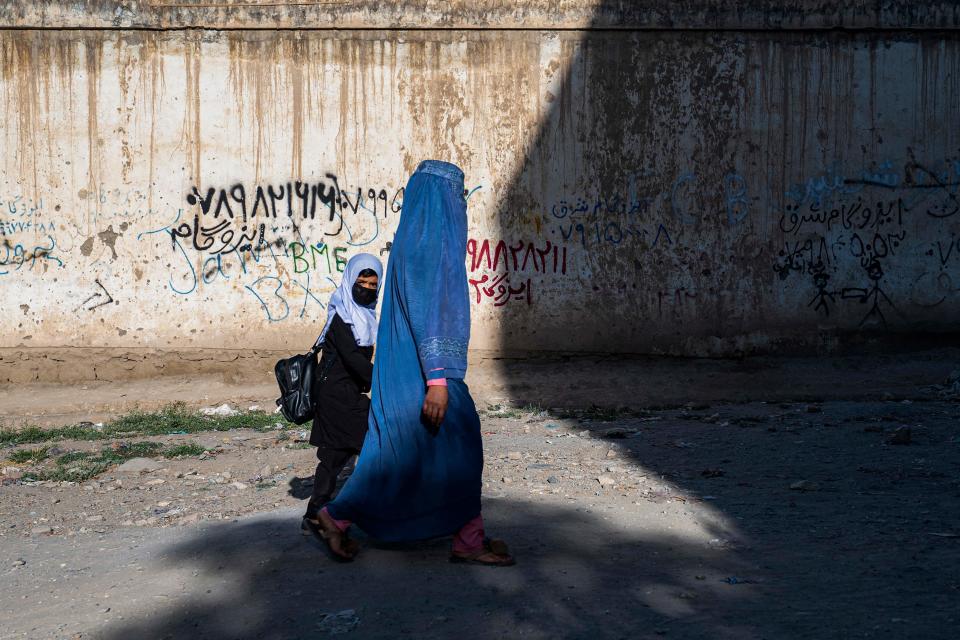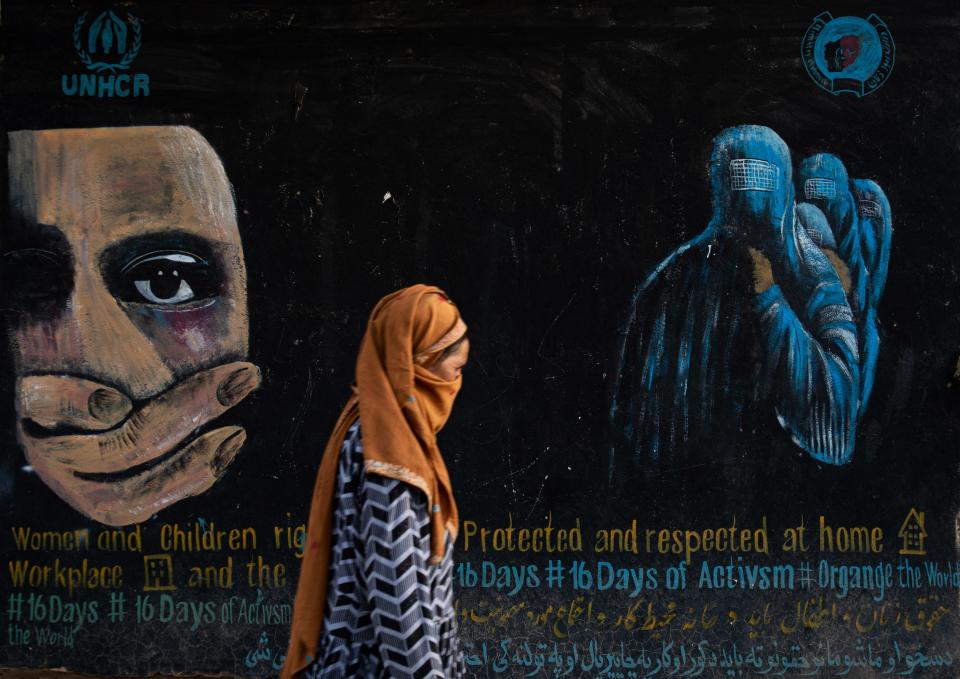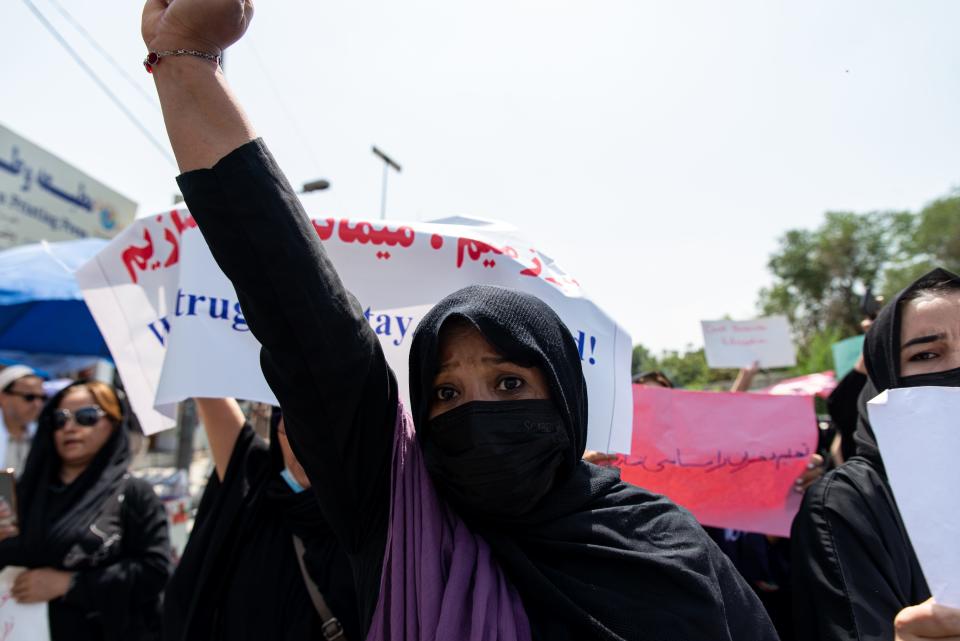'Death in slow motion': Women in Afghanistan cope with fear, loss of rights under Taliban rule
EDITOR’S NOTE: The Afghan women quoted in this story are identified by only by their first names to protect them against the risk of danger.
Soha’s life is filled with fear.
Just a year ago, it was filled with opportunity.
The fall of Afghanistan, the hasty retreat of U.S. and allied troops last August, and the Taliban’s resurgence changed everything.
“With the return of the Taliban, I lost everything: my friends, my life, my basic rights, my work – the chances of going for a picnic,” the 33-year-old woman said in an interview with USA TODAY. She, along with other Afghan women interviewed, asked that only their first names only be used.
Before the Taliban marched back to power and reinstated its repressive policies, Soha worked part time as a professor at a university and held a high-ranking government position.
Now she’s terrified to leave her home – afraid she’ll be stopped on the street because her clothing doesn’t conform to the Taliban’s strict dress code, afraid Taliban leaders will find out about her occasional work as a translator for journalists and documentarians, afraid of what will happen to her family if her secret is revealed. At night, her sleep is tormented by nightmares.
“I am like a prisoner now,” she said.
Across Afghanistan, women like Soha have seen their lives altered in unthinkable ways in the year since the Taliban returned to rule the country following two decades of war.
A report last month by the human rights group Amnesty International catalogued the hardships inflicted upon women and girls under the Islamic militant regime. The organization interviewed more than 100 women and girls, as well as staff members of Taliban-run detention centers, international experts and journalists.
The 98-page report’s description of their lives under Taliban rule: “Death in slow motion.”
“In less than a year, the Taliban have decimated the rights of women and girls in Afghanistan,” the report concluded. “They have violated women’s and girls’ rights to education, work and free movement; demolished the system of support for women and girls fleeing domestic violence; arbitrarily detained women and girls for infractions of the Taliban’s discriminatory rules; and contributed to a surge in the rates of child, early and forced marriage.”
Women who peacefully protested against the harsh restrictions and policies “have been harassed, threatened, arrested, forcibly disappeared, arbitrarily detained and tortured,” the report said.
'A self-inflicted wound': US withdrawal from Afghanistan still haunts Biden's presidency one year later

A 'miserable' life for women and children in Afghanistan
In the days before their return to power, the Taliban had promised that women’s rights would be respected and claimed the new regime's leaders were more moderate than their predecessors, who imposed harsh restrictions on women in the 1990s.
Human rights experts and activists viewed the Taliban’s assurances with skepticism. Their suspicions were quickly borne out, said Marie Clarke, chief programs officer at Women for Women International, a human rights group headquartered in Washington.
Opinion: Botched withdrawal scarred Biden's presidency, plunged Afghanistan further into strife
“One of my Afghan colleagues had said, for the first six months, it will seem like the Taliban is the new Taliban and is going to respect women’s rights, but after six months, you will see: They will revert back to being the old Taliban,” Clarke recalled.
“Almost to the day, around six months after Taliban had taken power, we started to see that reversal in their rhetoric about upholding women’s rights,” she said.
Taliban leaders issued a series of decrees that ordered women to wear head-to-toe clothing in public, banned girls from attending school beyond the sixth grade and barred women from traveling anywhere but short distances unless accompanied by a close male family member.
Many women in the private sector were removed from high-level jobs, and most female government employees were ordered to stay at home. The exception: Women working in certain sectors, such as health care and education.
Afghan refugees in US: 'I cannot pretend to be OK': Afghan refugees torn between new lives in US and haunting reality of home
Military victory has emboldened the most hard-line voices in the Taliban, and many feel they shouldn’t make any compromises when it comes to women’s rights, said Ashley Jackson, who has done extensive research on the Taliban and civilians living under their control.
Even so, “the reality is that there is no consensus, and there are differences of opinion within the movement about these issues,” said Jackson, co-director of the Centre for the Study of Armed Groups.
Several people in power – such as Sirajhuddin Haqqani, a deputy leader and the de factor defense minister, and Mullah Mohammad Yaqoob Mujahid, the de facto interior minister – are believed to see no problem with women working and girls attending school under certain conditions, Jackson said.
But the Taliban’s supreme leader, Mullah Haibatullah Akhundzada, staunchly opposes women working and girls attending school – “and his final say is irrefutable,” Jackson said.
The diversity of views is reflected on the ground. In at least nine of Afghanistan’s 34 provinces, some secondary schools are opening, and in some places, women are working, Jackson said.
“Some local Taliban are just looking the other way, either because they don’t agree or because these decisions are so unpopular that they risk losing local support if they enforce them,” she said. “But in many other places, women have lost nearly all of their rights.”
'A bigger price': Taliban's Afghanistan takeover deals a harsh blow to Biden's 'America is back' foreign policy promise
The harsh restrictions on women’s movement have left many of them unable to access critical humanitarian aid or provide for their families, according to a report in August by Women for Women International.
Some 93% of women told the organization they had less income or none at all since the Taliban’s return, and 96% of women reported not having enough to eat, the report said.
Critics say the situation has been made even more precarious by the Biden administration’s refusal to release $3.5 billion in frozen assets to Afghanistan’s central bank.
The U.S. froze the funds last year after the collapse of the Afghan government and the Taliban’s return to power. President Joe Biden signed an order in February allowing the assets to eventually be distributed in Afghanistan, but his administration disclosed in mid-August the funds won’t be released anytime soon because of the fear they could end up in the hands of terrorists.
The United States' actions amount to “a form of collective punishment” and have brought about the economic collapse of the country, Jackson said.
“Ordinary Afghans – especially women and children – are the ones suffering most,” she said. “Afghan children are starving to death nearly every day. Child labor has skyrocketed. People are selling their children and marrying their daughters off at frighteningly young ages.”
Freezing assets isn’t making the Afghan government change its position on women, “but it is actively making life miserable for Afghan women and children,” Clarke said.
Former Afghan attorney general: I felt helpless: A year after the fall of Kabul, the world can still help Afghanistan

‘Those with short clothes and no socks were whipped’
Rahela used to fear bomb explosions would kill her or rip the limbs from her body. Now she fears something she says is worse: Death or punishment at the hands of the Taliban.
The 30-year-old follows the Taliban’s strict dress code and wears a hijab and covers her face whenever she’s outside. Still, trouble is often around the corner.
One day, Rahela’s sister, who studies at a university, asked her to go to the school and pay her fees. Rahela got dressed and headed out. Her mistake: She failed to put on socks.
“I was almost near the university, where I saw the Taliban stopping cars and asking women to get down to check their clothes,” she told USA TODAY. “Those with short clothes and no socks were whipped by the Taliban in public. I was so scared that I literally saved my life by hiding behind one car to another until I was able to run.”
Before the fall of Afghanistan, Rahela worked for two years as a teacher in the Daikundi province. Now she has no job and lives with her 12-year-old son in a rented house. Their only source of income is the small amount she receives for attending an English class. She uses that to cover her rent and pay for her son’s education. She’s willing to work – as a teacher or even cleaning houses – but no one will hire her.
Last year, her husband left her for another woman. He provides no financial support for Rahela or her son. Nor will he grant her a divorce.
“I went to court several times to ask for divorce,” Rahela said, “but I was told to wait for three years, and if after these three years my husband would neither show up nor provide financial support for me and my son, only then I can file divorce in his absence.
“God knows whether I would still be alive after these three years or not,” she said.
War in Afghanistan lingers: After six deployments, he was ready to move on from the war in Afghanistan. It followed him to Pennsylvania.
Threatening messages and stolen dreams
The threats started after Afghanistan fell and criminals and prisoners were freed.
Hosnia changed her phone number. She moved to a different house. But her tormenters always seemed to find her.
“I kept receiving calls from different individuals telling me they know where my house is and that they would come after me,” she said. “It became a nightmare for me.”
Before the fall of Afghanistan, Hosnia was a prosecutor in Kabul province. She investigated criminals and brought them to justice.
Many of the cases she took on involved women’s and children’s rights. Some focused on children who were used by the Taliban to plant mines and destroy bridges or other public infrastructure. Others involved women who were harassed in the workplace before getting promoted to higher positions.
“Our responsibility was to help women learn about their rights and not to be afraid to raise their voices,” the 32-year-old said.
Hosnia has left her house only a few times since Afghanistan collapsed. She fears the Taliban will recognize her and punish her. She did attend a few protests, thinking she could use her knowledge to help the Taliban understand women’s rights and persuade them to allow women to work and get an education.
Instead, “I kept hearing the words ‘whore’ again and again,” she said. “I stopped there and decided neither to face the Taliban and talk to them nor do something that would make me in trouble.”
The Taliban’s takeover of the country has stolen everything from her, she said. “I never imagined my life, my dreams and my goals would get destroyed like this,” she said.
Fall of Kabul, fall of Saigon: Their horror was our horror. Anguished, we pray for a miracle

Refusing to conform and live in fear under Taliban rule
Parwana is stubborn.
At 23, she refuses to dramatically alter the way she dresses just to conform to the Taliban’s rules.
“In the past, I used to wear a short shirt or T-shirt and didn’t care much about covering my hair, but now I wear a little bit longer dress when I go out,” she said. “I still go to cafes and public gardens with my friends, and my Instagram account is still active with me posting my own pictures without covering my hair or bothering with my short clothes.”
When she and her friends go out, “we take a taxi and directly go to cafes or gardens,” she said.
Once there, “we cover our hair outside and uncover it once we are inside. Most of the restaurants and cafes don’t allow women, but the places where we go, I personally try to make myself feel comfortable, and therefore I uncover my hair.”
On Instagram, she has gotten many threatening messages from people warning that they know where she lives and that they’re coming for her unless she shuts down her account.
“I am not afraid of them and their messages,” she said. “I just cannot live in fear.”
Parwana was a second-year university student studying international relations and political science when Afghanistan collapsed. Her family stopped her from attending the university after that, and she had to quit her internship at a television station because it was no longer safe. She and her family hope to leave the country later this year.
“Until then,” she said, “I try to adjust by wearing whatever I want and doing whatever I like. I just cannot follow the Taliban rules, and I don’t want to follow.”
Watchdog: US troop pullout was key factor in Afghan collapse
This article originally appeared on USA TODAY: Women in Afghanistan detail fear, loss of rights under Taliban rule

